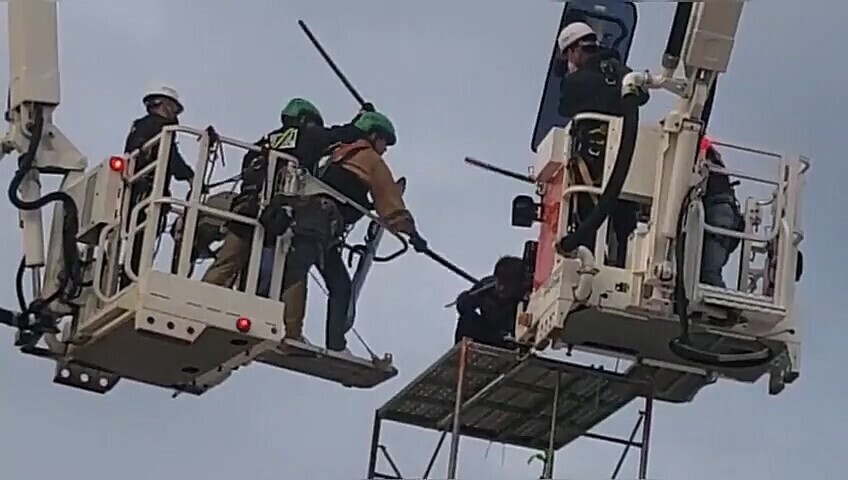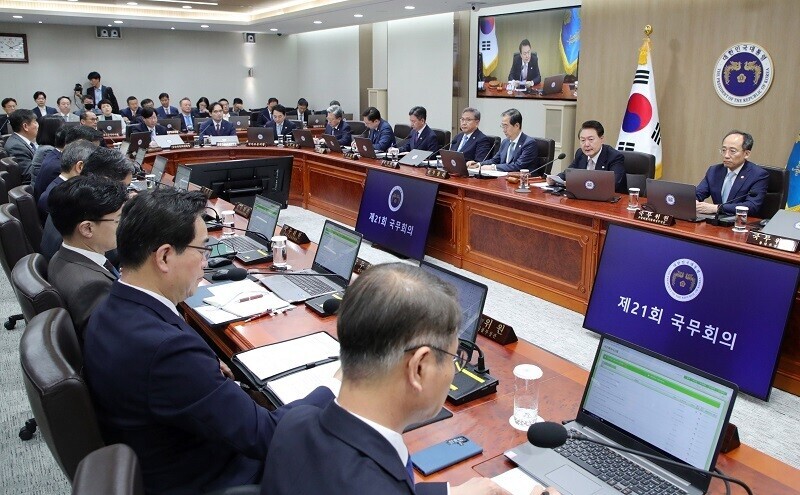hankyoreh
Links to other country sites 다른 나라 사이트 링크
[Column] The dangers of unchecked police power


A shocking scene recently unfolded when police brutally beat a Federation of Korean Trade Unions (FKTU) official with clubs while forcibly bringing him down from an aerial protest in front of the POSCO steel plant in Gwangyang.
The Jeonnam (South Jeolla) Provincial Police maintained that they had “no choice but to use the police batons to restrain the official when he brandished a metal pipe to resist.” Leaving aside any question of the legitimacy of their decision to forcibly end a protest, there is no justification for several armed police officers collectively assaulting a single person who no longer had the capacity to resist.
Koreans can remember what sorts of tragedies arose in the past when the police were unrestrained in their exercise of force.
With this sort of attitude from the police leadership in addition to the remarks made by the president, it would not be strange to see similar or worse incidents continuing to take place in the future.
The death of Myongji University student Kang Gyeong-dae in April 1991 happened after the Ministry of Home Affairs public security headquarters ordered front-line police officers to “respond forcefully to illegal and violent demonstrations in the interest of state security.”
Fourteen years ago, six people died in what became known as the “Yongsan tragedy,” which occurred during an overzealous early morning crackdown against demolition protestors who were occupying a building’s roof.
One of the most pronounced characteristics of an authoritarian government is the immoderate use of force by public authorities on the pretext of responding to “violence.” What has kept this in check as various laws, regulations, and practices have been overhauled has been the progress made in South Korean democracy.
Now the Yoon Suk-yeol administration is loosening those restraints.
The rationales given by the administration for cracking down so hard on assemblies and demonstrations have had to do with “illegality,” “violence,” and “inconveniencing the public.” Korean National Police Agency Commissioner-General Yoon Hee-keun has declared that the police will “confidently play its necessary role against illegal actions committed repeatedly [by parties] holding the public’s freedom hostage.”
But it is nothing more than semantics to talk about “the public’s freedoms” while choking off the right to assemblies and demonstrations, which is one of the most important rights the public holds.
The South Korean Constitution unambiguously states that the right to assemblies and demonstrations is a basic right and that “licensing of assembly and association shall not be recognized.”
This casual slapping of the “illegal” label on assemblies and demonstrations is just one more example of the illiberal intent to punish “subversive ideas,” even when the public enjoys freedom of thought.
To be sure, one person’s demonstration can be another person’s inconvenience. But the reason contemporary states guarantee the freedom of assembly and demonstration as a basic right is based on the idea that we should not restrict them based simply on the “inconvenience” they cause, as long as they are not inflicting direct harm on others.
After all, we ourselves might end up inconveniencing others somewhat at some point while expressing our views in public. This is an important channel for listening to the voices of minorities in a pluralized society.
At the apex of this overzealous response by the police stands Yoon Suk-yeol himself.
Yoon has said that the book with the biggest influence on him was “On Liberty” by John Stuart Mill. It is said that reading this book as a student left such a deep impression on him that he changed course from economics to law.

Indeed, People Power Party National Assembly member Chung Jin-suk has lauded Yoon for having “cultivation as a leader” as someone who was “enthralled by ‘On Liberty’ by Mill, one of the great political thinkers of the 19th century.” Some media outlets declared that “On Liberty” was one of the reasons he used the Korean word for “freedom” or “liberty” 35 times in his inaugural address and continues emphasizing “liberal democracy” every chance he gets.
So what accounts for him so thoroughly disregarding the detailed explanation “On Liberty” gives on why the freedom to express opinions is the most central of all freedoms?
Mill clearly acknowledged how crucially important it is for members of minorities and vulnerable individuals to be able to express their views through approaches such as assemblies and demonstrations.
There’s no reason why a majority of people would opt for such an approach. Mill outlined four reasons for listening to even the views expressed by a small minority of people.
“First, if any opinion is compelled to silence, that opinion may, for aught we can certainly know, be true. [. . .] Secondly, though the silenced opinion be an error, it may, and very commonly does, contain a portion of truth [and] it is only by the collision of adverse opinions that the remainder of the truth has any chance of being supplied,” he writes.
“Thirdly, even if the received opinion be not only true, but the whole truth; unless it is suffered to be, and actually is, vigorously and earnestly contested, it will, by most of those who receive it, be held in the manner of a prejudice, with little comprehension or feeling of its rational grounds. [. . .] [F]ourthly, the meaning of the doctrine itself will be in danger of being lost, or enfeebled, and deprived of its vital effect on the character and conduct: the dogma [. . .] preventing the growth of any real and heartfelt conviction.”
The fact that democratically elected governments are not always democratic has been shown all around the world since the 2000s. I hope Yoon Suk-yeol can reflect on why it is that worries about the regression of democracy tend to grow each time a conservative administration takes office in South Korea.
Even if this immoderate police response is intended politically as a way of rallying conservative votes ahead of next year’s general election, we would expect that there are at least some lines a president who deeply admired “On Liberty” should not cross.
Please direct questions or comments to [english@hani.co.kr]

Editorial・opinion
![[Editorial] Intensifying US-China rivalry means Seoul must address uncertainty with Beijing sooner than later [Editorial] Intensifying US-China rivalry means Seoul must address uncertainty with Beijing sooner than later](https://flexible.img.hani.co.kr/flexible/normal/500/300/imgdb/original/2024/0517/8117159322045222.jpg) [Editorial] Intensifying US-China rivalry means Seoul must address uncertainty with Beijing sooner than later
[Editorial] Intensifying US-China rivalry means Seoul must address uncertainty with Beijing sooner than later![[Column] When ‘fairness’ means hate and violence [Column] When ‘fairness’ means hate and violence](https://flexible.img.hani.co.kr/flexible/normal/500/300/imgdb/original/2024/0516/7417158465908824.jpg) [Column] When ‘fairness’ means hate and violence
[Column] When ‘fairness’ means hate and violence- [Editorial] Yoon must stop abusing authority to shield himself from investigation
- [Column] US troop withdrawal from Korea could be the Acheson Line all over
- [Column] How to win back readers who’ve turned to YouTube for news
- [Column] Welcome to the president’s pity party
- [Editorial] Korea must respond firmly to Japan’s attempt to usurp Line
- [Editorial] Transfers of prosecutors investigating Korea’s first lady send chilling message
- [Column] Will Seoul’s ties with Moscow really recover on their own?
- [Column] Samsung’s ‘lost decade’ and Lee Jae-yong’s mismatched chopsticks
Most viewed articles
- 1[Editorial] Transfers of prosecutors investigating Korea’s first lady send chilling message
- 2For new generation of Chinese artists, discontent is disobedience
- 3[Photo] 1,200 prospective teachers call death of teacher “social manslaughter”
- 4S. Korea “monitoring developments” after report of secret Chinese police station in Seoul
- 5Xi, Putin ‘oppose acts of military intimidation’ against N. Korea by US in joint statement
- 6[Exclusive] Unearthed memo suggests Gwangju Uprising missing may have been cremated
- 7[Column] Samsung’s ‘lost decade’ and Lee Jae-yong’s mismatched chopsticks
- 8[Special reportage- part I] Elderly prostitution at Jongmyo Park
- 9Chun Doo-hwan arrived in Gwangju by helicopter before troops opened fire on civilians
- 10[Interview] Recalling seeing soldiers secretly burying bodies behind Gwangju Prison